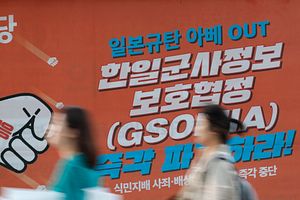While the initial shock and outcry over economic tensions between South Korea and Japan have simmered in recent weeks, the trade war between the two nations has quietly but conspicuously raged on. Koreans have continued boycotting Japanese products while several Japanese firms have decided to or are contemplating their withdrawals from the Korean market. In Washington, experts are alarmed at Seoul’s decision to discontinue GSOMIA, arguing that it plays right into the hands of North Korea and China by weakening trilateral security cooperation between the United States and its two most important allies in East Asia.
Many have pointed to historical animosity between the two neighbors, contrasting views over the “final and irreversible” nature of the 2015 agreement, and lack of mediation by the United States as key reasons behind this rapid downturn in bilateral relations. Even the threat posed by Pyongyang evidenced by its frequent missile tests in recent months appears to have done little to curb rising tensions.
As the dispute wears on, a growing number of observers have also suggested that the root of the problem lies in the current political environment in Seoul. Jennifer Lind has noted how the “crisis fits a predictable pattern” in which a progressive government tends to be “more dovish toward North Korea and more prickly toward Japan and the United States.”
This certainly appears to be the case in 2019. Critics of the current progressive government have consistently denounced the President Moon Jae-in’s approach to North Korea as too weak. By standing firm against economic pressure from Tokyo, the Blue House is demonstrating its resolve to the general public. Seoul has also used its quarrel with Tokyo to signal its independence from Washington. High-ranking South Korean officials have openly retorted that Seoul would not seek mediation because they would then get slapped with a hefty bill in return. Given such incentives and disincentives, it appears unlikely that Seoul will back down and seek to end the feud.
Though it may resemble similar instances from the past, what is unique about this present moment is U.S. President Donald Trump’s apparent eagerness to pursue negotiations with North Korea. Unlike previous U.S. administrations that showed little to no interest in direct bilateral talks with Pyongyang, the Trump White House continues to hint at the possibility of the next round of talks between the two leaders despite substantial setbacks earlier this year. Recent reports suggest that the United States and North Korea may meet again as early as late September.
However unrealistic a breakthrough may seem to be, the fact that there is an ongoing dialogue of sorts between the United States and North Korea gives Seoul further leeway to maintain its current conciliatory stance vis-à-vis Pyongyang.
Moreover, this unique set of circumstances has exposed the stark differences that lie in how Seoul and Tokyo perceive North Korea as a threat to their national security. North Korea’s missile and nuclear weapons programs often overshadow the fact that most South Koreans still believe unification between the two Koreas to be both desirable and feasible. And in this regard, Pyongyang will never be an adversary for Seoul in the same way it is for Japan. The current political climate has made this gap more discernible than ever.
Historically, calls for a stronger partnership between Seoul and Japan, and by extension trilateral cooperation including the United States, have been predicated on the notion that it is necessary to deter North Korean aggression, and for good reason. But recent developments have unmasked the limitations of this approach. Unless policymakers realize this, tensions between Korea and Japan will likely persist. Unless this underlying issue is confronted, stopgap measures will remain vulnerable to unforeseen outbursts that rile up nationalistic sentiments in both countries.
This means that the problem can only be solved by detaching underlying issues of resentment and distrust between Seoul and Tokyo from threats to national security that the Kim regime poses. Revisiting the 2015 agreement may hold the key. Aware of the domestic controversy that surrounded the agreement in Korea, Japan should at least consider reopening negotiations. South Korea, on the other hand, should accept full responsibility for violating international norms by backtracking on the agreement. Renegotiation would only be possible with these concessions made by both sides, but it would cultivate a level of trust that has been absent from past conversations. Talks should refrain from being accusative and instead focus on broader themes of mutual trust-building and female empowerment and mutual trust-building. Discussions on bilateral and trilateral security cooperation can certainly coexist, but the North Korean problem shouldn’t dominate the process.
Much like it did a few years ago, the United States can and should play a positive role in facilitating reconciliation between its two allies through such processes. But to do so, it must not overly stress the importance of a vigorous trilateral relationship when it rests on such shaky ground. Insisting that Seoul rejoin GSOMIA, for example, will only exacerbate the situation by making South Korea more skeptical about Washington’s ability to arbitrate impartially. Trilateral cooperation that increases the security of the countries involved should be the reward of improved relations between Seoul and Tokyo, not dangled as an implicit threat to make these two regional rivals get along.
DongJoon Park is a Ph.D. candidate at the Department of Government at Georgetown University.

































